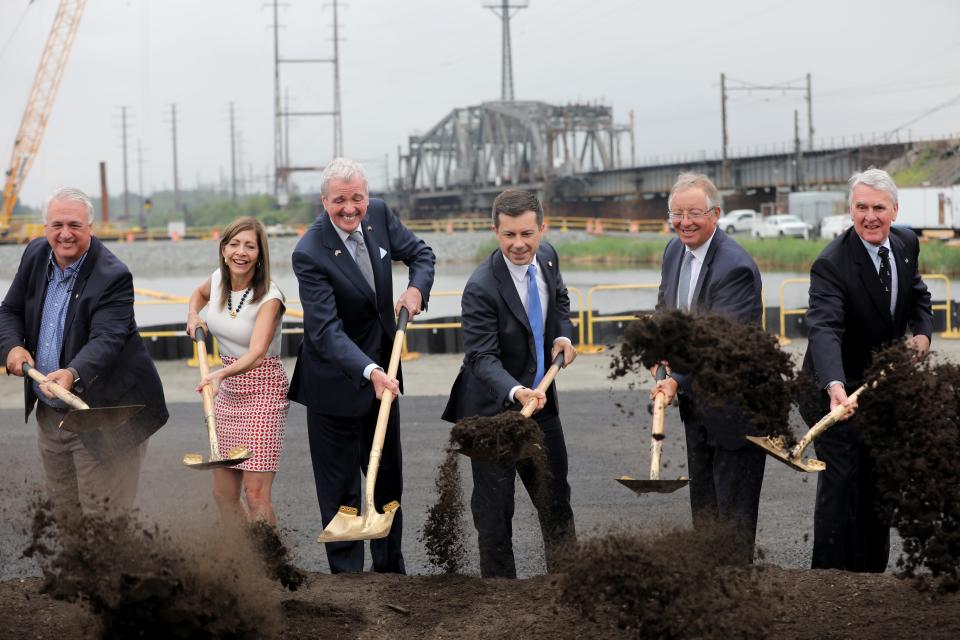NJ politicians wasted chance to fix systemic problems in latest budget: Stile
- Oops!Something went wrong.Please try again later.
- Oops!Something went wrong.Please try again later.
The surprisingly chaotic days leading to a $54.3 billion state budget obscured one disappointing outcome: The Democrats who run the table in Trenton simply wasted a big chance to finance long-overdue and systemic change.
In some ways, you could reach the same conclusion every June when the budget negotiations in Trenton reach a climax and enter the closed rooms before they tack on the pork and tweak budget language in ways that benefit a power broker or donor.
But this year was different. It may be years, possibly decades, before New Jersey finds itself so flush with cash to tackle long-festering and chronic problems. It has been a bounteous time, a confluence of federal pandemic aid, healthy revenue collections and savings from refinanced debt.
It gave the state the resources to repair and invest in ways creative and long-term and necessary. Yet that federal pandemic aid is running out and revenues are declining as signs of a recession hover on the horizon. The window is closing.
If there ever was a time to do the grimy work of revamping Motor Vehicle Commission operations or unemployment insurance systems that failed to churn out checks during the height of the COVID lockdowns, this was the time to do it.
Instead, the state is once again resorting to temporary, Band-Aid repairs, leaving consumers and workers to contend with computer systems that rival the creaky EMERAC model of the 1957 Hepburn-Tracy movie “Desk Set.”
For years, commuters have been plagued by a crumbling transit system. At the outset of Gov. Phil Murphy’s reign, he vowed to fix NJ Transit even it kills him.

Well, he’s still alive and apparently well, with a healthy crop of hair, but the agency is staring at a projected $1 billion operating deficit by 2026, a problem that may require fare hikes, service cuts (“service alignments,’’ as Transportation Commissioner Diane Gutierrez-Scaccetti calls them) and layoffs. Hardly the long-term vision for a transit agency that should be expanded and modernized for the ambitious climate-change goals of the state.
"It is not something that we solve in one year and it goes away, it’s something that is structural to our operating budget and has to have a long-term solution," she told reporters in April.
Don’t look for any long-term solution in this budget. For years, the idea of creating a steady, dedicated revenue stream for NJ Transit’s operations was bandied about — even the 2017 candidate Murphy momentarily flirted with the idea of creating a special tax for the agency.
Stile: What do NJ Democrats, once Christie targets, think of his assault on Donald Trump?
But instead, it's more of the same old rob-Peter-to-Pay-Paul method of paying for day-to-day operations by siphoning money from the turnpike authority, its own budget for capital construction, and an account for clean energy projects.
There are other long-simmering needs. Affordable housing remains one of the nagging burrs right beneath the gloss of Murphy’s “stronger, fairer” slogan. For all the talk of the “flight” of New Jersey residents to low-tax states to the south, advocates are more concerned about attracting and retaining young, up-and-coming families who are crammed into apartments with soaring rents. The housing stock is woefully inadequate.

“I think we overall view this as a pretty big missed opportunity,’’ said Peter Chen, senior policy analyst for New Jersey Policy Perspective, a liberal think tank. “They're just throwing the money out left and right, instead of shoring up the sort of structural problems that had been around for a long time and will continue to be around.”
That’s not to say there aren’t admirable features of the spending plan. Murphy should be applauded for restoring the state’s obligation to the pension fund with a full payment, rather than skipping or shorting it, as previous administrations did. He’s expanding preschool funding for public schools and doubling the size of a child care tax credit for families earning less than $80,000. His salting away a healthy $10 billion surplus is helping restore confidence in the state’s fiscal picture on Wall Street.
But for the most part, it is an election-year giveaway budget stuffed with the Mother of All Short-Term Thinking ideas: sending out generous rebates in time for a crucial election season when all 120 seats in the Legislature are up for grabs.
Stile: NJ tax rebates are usually politically expendable. Can StayNJ be the exception?
Murphy, Senate President Nicholas Scutari and Assembly Speaker Craig Coughlin reached a compromise on a plan to create a tax credit program that promises to slash the property tax bill of seniors homeowners by 50% or up to $6,500.
These Democrats — the party of the blue-collar voters and the disenfranchised, you may remember — agreed to send the windfall to households with income of up to $500,000.
Asked to explain giving a break to the wealthiest, who more than likely have the means to pay the property taxes while maintaining a winter home in Florida, Coughlin basically said they wanted to encourage as many seniors as possible to remain in New Jersey.
Hardly a persuasive answer. The more likely reason is that the promised benefit — which won’t be launched until 2026 — is a program Democrats can promote in their campaign TV ads and mailers in the fall election.
It could shore up votes in crucial, swing areas like the 11th Legislative District, home to wealthy enclaves, where incumbent Democrat Vin Gopal is being challenged by Steve Dnistrian, a public relations executive.
Despite the tense negotiations over this program, it may never see the light of day. There is no guarantee that the lawmakers will be eager to pay the $1.3 billion tab for the program in three years, especially if the current droop in revenues remains a downward trend.
In the meantime, lawmakers beefed up last year’s vote-buying gimmick, the ANCHOR rebate, by an extra $250 for seniors and renters.
The rebate-stuffed budget comes amid warnings from a bipartisan chorus of economists who predicted last week that even without StayNJ, the state is likely to fall $12.5 billion to $18.5 billion short of the projected expenditures needed to continue current services and state aid from the beginning of next year to 2028.
“New Jersey fiscal policy has been hampered for decades by the failure to look ahead,” said Mark Magyar, director of the Steve Sweeney Center For Public Policy at Rowan University.
Right now, the Democrats, who have maintained a majority for nearly two decades, are looking over their shoulder at a restive Republican Party that made surprising gains in the 2021 elections and are now campaigning with the aid of a more favorable legislative map. Democrats are jittery.
This year, with the extra billions on hand, could have been the time to look to the future. But instead, the budget finances the immediate future of the November elections.
This article originally appeared on NorthJersey.com: NJ budget 2024 shows cash buys votes, doesn't fix issues

